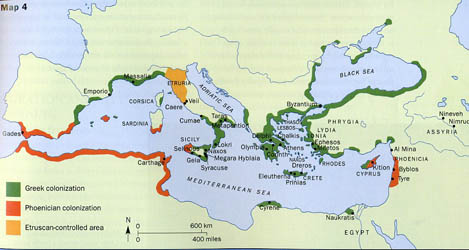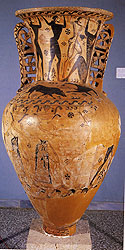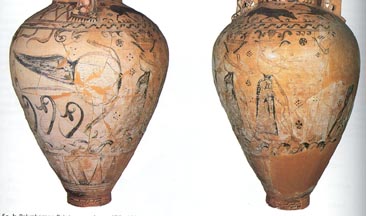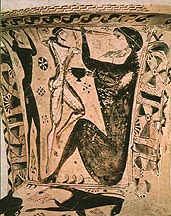Art
Home | ARTH Courses | ARTH
209 Home | ARTH 209 Assignments
Excerpts
from Homer, Odyssey, IX

The end of the eighth
century and the seventh century was marked in Greek culture by the process
of colonization, when the Greek city states established colonies in other
parts of the Mediterranean world. This period is also called the Orientalizing
period. This label given by modern scholars is a reference to the Eastern
or Oriental influences on Greek culture brought about by the contact the Greeks
had with the Ancient Near Eastern cultures during this period of colonization.
The Odyssey can be read from these perspectives. In the first part of this
passage, Odysseus and his cohorts arrive on the island of the Cyclopes and
they assess their environs. Note the colonist’s perspective here as they
assess the adjacent island. The most famous part of Odyssey IX recounts Odysseus’s
encounter with the Cyclops Polyphemos. In this context the Cyclopes can be
read as the non-Greek, “barbarian.” It is also a good example of
heroic “arete”. Try to articulate the values and priorities of Greek
culture re-presented in these passages.

The amphora
above was found at an ancient graveyard at Eleusis. It was a gravemarker for
a male's grave. It is an important monument in the development of narrative
representations. On the belly of the vase is represented the story of the
hero Perseus fleeing with the aid of Athena from the Gorgons after he had
beheaded Medusa.

This
story was widely popular in the art of the 7th and 6th centuries. It is interesting
to note the experimental nature of this narrative by observing the form of
the gorgons that do not reflect the later canonical form. On the neck of this
vase is represented the story of Odysseus Blinding Polyphemos:

Compare
this representation to the Homeric account that follows. Note the thematic
connections of the stories shown on this vase.
[105] “Thence we
sailed on, grieved at heart, and we came to the land of the Cyclopes, an overweening
and lawless folk, who, trusting in the immortal gods, plant nothing with their
hands nor plough; but all these things spring up for them without sowing or
ploughing, [110] wheat, and barley, and vines, which bear the rich clusters
of wine, and the rain of Zeus gives them increase. Neither assemblies for
council have they, nor appointed laws, but they dwell on the peaks of lofty
mountains in hollow caves, and each one is lawgiver [115] to his children
and his wives, and they reck nothing one of another.
“Now there is a level
isle that stretches aslant outside the harbor, neither close to the shore
of the land of the Cyclopes, nor yet far off, a wooded isle. Therein live
wild goats innumerable, for the tread of men scares them not away, [120] nor
are hunters wont to come thither, men who endure toils in the woodland as
they course over the peaks of the mountains. Neither with flocks is it held,
nor with ploughed lands, but unsown and untilled all the days it knows naught
of men, but feeds the bleating goats. [125] For the Cyclopes have at hand
no ships with vermilion cheeks, nor are there ship-wrights in their land who
might build them well-benched ships, which should perform all their wants,
passing to the cities of other folk, as men often cross the sea in ships to
visit one another — [130] craftsmen, who would have made of this isle
also a fair settlement. For the isle is nowise poor, but would bear all things
in season. In it are meadows by the shores of the grey sea, well-watered meadows
and soft, where vines would never fail, and in it level ploughland, whence
[135] they might reap from season to season harvests exceeding deep, so rich
is the soil beneath; and in it, too, is a harbor giving safe anchorage, where
there is no need of moorings, either to throw out anchor-stones or to make
fast stern cables, but one may beach one's ship and wait until the sailors'
minds bid them put out, and the breezes blow fair. [140] Now at the head of
the harbor a spring of bright water flows forth from beneath a cave, and round
about it poplars grow. Thither we sailed in, and some god guided us through
the murky night; for there was no light to see, but a mist lay deep about
the ships and the moon [145] showed no light from heaven, but was shut in
by clouds. Then no man's eyes beheld that island, nor did we see the long
waves rolling on the beach, until we ran our well-benched ships on shore.
And when we had beached the ships we lowered all the sails [150] and ourselves
went forth on the shore of the sea, and there we fell asleep and waited for
the bright Dawn.
“As soon as early
Dawn appeared, the rosy-fingered, we roamed throughout the isle marvelling
at it; and the nymphs, the daughters of Zeus who bears the aegis, roused [155]
the mountain goats, that my comrades might have whereof to make their meal.
Straightway we took from the ships our curved bows and long javelins, and
arrayed in three bands we fell to smiting; and the god soon gave us game to
satisfy our hearts. The ships that followed me were twelve, and to each [160]
nine goats fell by lot, but for me alone they chose out ten....
“As soon as early Dawn
appeared, the rosy-fingered, he [the cyclops Polyphemus] rekindled the fire
and milked his goodly flocks all in turn, and beneath each dam placed her young.
[310] Then, when he had busily performed his tasks, again he seized two men
at once and made ready his meal. And when he had made his meal he drove his
fat flocks forth from the cave, easily moving away the great door-stone; and
then he put it in place again, as one might set the lid upon a quiver. [315]
Then with loud whistling the Cyclops turned his fat flocks toward the mountain,
and I was left there, devising evil in the deep of my heart, if in any way I
might take vengeance on him, and Athena grant me glory.
“Now this seemed to
my mind the best plan. There lay beside a sheep-pen a great club of the Cyclops,
[320] a staff of green olive-wood, which he had cut to carry with him when dry;
and as we looked at it we thought it as large as is the mast of a black ship
of twenty oars, a merchantman, broad of beam, which crosses over the great gulf;
so huge it was in length and in breadth to look upon. [325] To this I came,
and cut off therefrom about a fathom's length and handed it to my comrades,
bidding them dress it down; and they made it smooth, and I, standing by, sharpened
it at the point, and then straightway took it and hardened it in the blazing
fire. Then I laid it carefully away, hiding it beneath the dung, [330] which
lay in great heaps throughout the cave. And I bade my comrades cast lots among
them, which of them should have the hardihood with me to lift the stake and
grind it into his eye when sweet sleep should come upon him. And the lot fell
upon those whom I myself would fain have chosen; [335] four they were, and I
was numbered with them as the fifth. At even then he came, herding his flocks
of goodly fleece, and straightway drove into the wide cave his fat flocks one
and all, and left not one without in the deep court, either from some foreboding
or because a god so bade him. [340] Then he lifted on high and set in place
the great door-stone, and sitting down he milked the ewes and bleating goats
all in turn, and beneath each dam he placed her young. But when he had busily
performed his tasks, again he seized two men at once and made ready his supper.
[345] Then I drew near and spoke to the Cyclops, holding in my hands an ivy
bowl of the dark wine:
“‘Cyclops, take
and drink wine after thy meal of human flesh, that thou mayest know what manner
of drink this is which our ship contained. It was to thee that I was bringing
it as a drink offering, in the hope that, touched with pity, [350] thou mightest
send me on my way home; but thou ragest in a way that is past all bearing. Cruel
man, how shall any one of all the multitudes of men ever come to thee again
hereafter, seeing that thou hast wrought lawlessness?’
“So I spoke, and he
took the cup and drained it, and was wondrously pleased as he drank the sweet
draught, and asked me for it again a second time:
[355] “‘Give it
me again with a ready heart, and tell me thy name straightway, that I may give
thee a stranger's gift whereat thou mayest be glad. For among the Cyclopes the
earth, the giver of grain, bears the rich clusters of wine, and the rain of
Zeus gives them increase; but this is a streamlet of ambrosia and nectar.’
[360] “So he spoke,
and again I handed him the flaming wine. Thrice I brought and gave it him, and
thrice he drained it in his folly. But when the wine had stolen about the wits
of the Cyclops, then I spoke to him with gentle words:
“‘Cyclops, thou
askest me of my glorious name, and I [365] will tell it thee; and do thou give
me a stranger's gift, even as thou didst promise. Noman is my name, Noman do
they call me — my mother and my father, and all my comrades as well.’
“So I spoke, and he
straightway answered me with pitiless heart: ‘Noman will I eat last among
his comrades, [370] and the others before him; this shall be thy gift.’
“He spoke, and reeling
fell upon his back, and lay there with his thick neck bent aslant, and sleep,
that conquers all, laid hold on him. And from his gullet came forth wine and
bits of human flesh, and he vomited in his drunken sleep. [375] Then verily
I thrust in the stake under the deep ashes until it should grow hot, and heartened
all my comrades with cheering words, that I might see no man flinch through
fear. But when presently that stake of olive-wood was about to catch fire, green
though it was, and began to glow terribly, [380] then verily I drew nigh, bringing
the stake from the fire, and my comrades stood round me and a god breathed into
us great courage. They took the stake of olive-wood, sharp at the point, and
thrust it into his eye, while I, throwing my weight upon it from above, whirled
it round, as when a man bores a ship's timber [385] with a drill, while those
below keep it spinning with the thong, which they lay hold of by either end,
and the drill runs around unceasingly. Even so we took the fiery-pointed stake
and whirled it around in his eye, and the blood flowed around the heated thing.
And his eyelids wholly and his brows round about did the flame singe [390] as
the eyeball burned, and its roots crackled in the fire. And as when a smith
dips a great axe or an adze in cold water amid loud hissing to temper it —
for therefrom comes the strength of iron — even so did his eye hiss round
the stake of olive-wood. [395] Terribly then did he cry aloud, and the rock
rang around; and we, seized with terror, shrank back, while he wrenched from
his eye the stake, all befouled with blood, and flung it from him, wildly waving
his arms. Then he called aloud to the Cyclopes, who [400] dwelt round about
him in caves among the windy heights, and they heard his cry and came thronging
from every side, and standing around the cave asked him what ailed him:
“‘What so sore
distress is thine, Polyphemus, that thou criest out thus through the immortal
night, and makest us sleepless? [405] Can it be that some mortal man is driving
off thy flocks against thy will, or slaying thee thyself by guile or by might?’
“‘Then from out
the cave the mighty Polyphemus answered them: ‘My friends, it is Noman
that is slaying me by guile and not by force.’
“And they made answer
and addressed him with winged words: [410] ‘If, then, no man does violence
to thee in thy loneliness, sickness which comes from great Zeus thou mayest
in no wise escape. Nay, do thou pray to our father, the lord Poseidon.’
“So they spoke and
went their way; and my heart laughed within me that my name and cunning device
had so beguiled. [415] But the Cyclops, groaning and travailing in anguish,
groped with his hands and took away the stone from the door, and himself sat
in the doorway with arms outstretched in the hope of catching anyone who sought
to go forth with the sheep — so witless, forsooth, he thought in his heart
to find me. [420] But I took counsel how all might be the very best, if I might
haply find some way of escape from death for my comrades and for myself. And
I wove all manner of wiles and counsel, as a man will in a matter of life and
death; for great was the evil that was nigh us. And this seemed to my mind the
best plan. [425] Rams there were, well-fed and thick of fleece, fine beasts
and large, with wool dark as the violet. These I silently bound together with
twisted withes on which the Cyclops, that monster with his heart set on lawlessness,
was wont to sleep. Three at a time I took. The one in the middle in each case
bore a man, [430] and the other two went, one on either side, saving my comrades.
Thus every three sheep bore a man. But as for me — there was a ram, far
the best of all the flock; him I grasped by the back, and curled beneath his
shaggy belly, lay there face upwards [435] with steadfast heart, clinging fast
with my hands to his wondrous fleece. So then, with wailing, we waited for the
bright dawn.
“As soon as early Dawn
appeared, the rosy-fingered, then the males of the flock hastened forth to pasture
and the females bleated unmilked about the pens, [440] for their udders were
bursting. And their master, distressed with grievous pains, felt along the backs
of all the sheep as they stood up before him, but in his folly he marked not
this, that my men were bound beneath the breasts of his fleecy sheep. Last of
all the flock the ram went forth, [445] burdened with the weight of his fleece
and my cunning self. And mighty Polyphemus, as he felt along his back, spoke
to him, saying:
“‘Good ram, why
pray is it that thou goest forth thus through the cave the last of the flock?
Thou hast not heretofore been wont to lag behind the sheep, but wast ever far
the first to feed on the tender bloom of the grass, [450] moving with long strides,
and ever the first didst reach the streams of the river, and the first didst
long to return to the fold at evening. But now thou art last of all. Surely
thou art sorrowing for the eye of thy master, which an evil man blinded along
with his miserable fellows, when he had overpowered my wits with wine, [455]
even Noman, who, I tell thee, has not yet escaped destruction. If only thou
couldst feel as I do, and couldst get thee power of speech to tell me where
he skulks away from my wrath, then should his brains be dashed on the ground
here and there throughout the cave, when I had smitten him, and my heart [460]
should be lightened of the woes which good-for-naught Noman has brought me.’
“So saying, he sent
the ram forth from him. And when we had gone a little way from the cave and
the court, I first loosed myself from under the ram and set my comrades free.
Speedily then we drove off those long-shanked sheep, rich with fat, [465] turning
full often to look about until we came to the ship.



